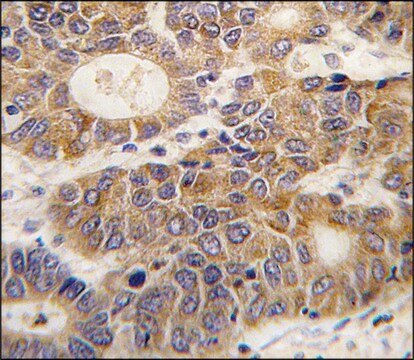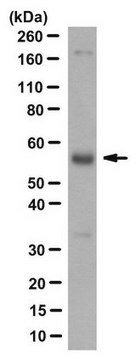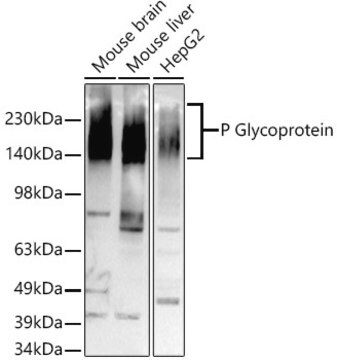ABS1030
Anti-Apolipoprotein D Antibody
serum, from rabbit
Synonym(s):
ApoD, Apolipoprotein D, Apo-D
Sign Into View Organizational & Contract Pricing
All Photos(1)
About This Item
UNSPSC Code:
12352203
eCl@ss:
32160702
NACRES:
NA.41
Recommended Products
biological source
rabbit
Quality Level
antibody form
serum
antibody product type
primary antibodies
clone
polyclonal
species reactivity
human
technique(s)
ELISA: suitable
western blot: suitable
NCBI accession no.
UniProt accession no.
shipped in
dry ice
target post-translational modification
unmodified
Gene Information
human ... APOD(347)
General description
Apolipoprotein D (ADOP), also known as Apolipoprotein D, Apo-D, ApoD, and encoded by the gene name APOD, is a member of the calycin superfamily and the Lipocalin family. Recent studies have suggested that Apolipoprotein D is involved in the transport and binding of bilin. Additioanlly, studies have demonstrated that Apolipoprotein D is able to transport a variety of ligands in a number of different contexts. Apolipoprotein D is a homodimer located in the plasma, and it also exists as a disulfide-linked heterodimer with APOA2. Apolipoprotein D is expressed in the liver, intestine, pancreas, kidney, placenta, adrenal, spleen, fetal brain tissue and tears. Apolipoprotein D is primarily localized in HDL (60-65%), with most of the remainder in VHDL and only small amounts in VLDL and LDL.
Immunogen
Protein purified from human plasma corresponding to Apolipoprotein D.
Application
Anti-Apolipoprotein D is an antibody against Apolipoprotein D for use in ELISA, WB.
ELISA Analysis: A representative lot of this antibody detected endogenous Apolipoprotein D in normal human plasma (Knipping, G., et al. Journal of Immunological Methods 202 1997. 85–95)
Western Blotting Analysis: A representative lot of this antibody at 1:5000 dilution detected endogenouse Apolipoprotein D in 5 µl of human plasma (Bottcher, A., et al. J. Lipid Res. 2000. 41: 905–915.)
Western Blotting Analysis: A representative lot of this antibody at 1:5000 dilution detected endogenouse Apolipoprotein D in 5 µl of human plasma (Bottcher, A., et al. J. Lipid Res. 2000. 41: 905–915.)
Research Category
Signaling
Signaling
Research Sub Category
Signaling Neuroscience
Signaling Neuroscience
Quality
Evaluated by Western Blotting on purified human Apolipoprotein D
Western Blotting Analysis: A 1:1000 dilution of this antibody detected 0.05 µg of purified human Apolipoprotein D
Western Blotting Analysis: A 1:1000 dilution of this antibody detected 0.05 µg of purified human Apolipoprotein D
Target description
~30 kDa observed, additional bands likely due to heavy N-glycosylation on this protein
Physical form
Rabbit polyclonal serum with 0.05% sodium azide.
Unpurified
Storage and Stability
"Stable for 1 year at -20°C from date of receipt.
Handling Recommendations: Upon receipt and prior to removing the cap, centrifuge the vial and gently mix the solution. Aliquot into microcentrifuge tubes and store at -20°C. Avoid repeated freeze/thaw cycles, which may damage IgG and affect product performance."
Handling Recommendations: Upon receipt and prior to removing the cap, centrifuge the vial and gently mix the solution. Aliquot into microcentrifuge tubes and store at -20°C. Avoid repeated freeze/thaw cycles, which may damage IgG and affect product performance."
Other Notes
Concentration: Please refer to lot specific datasheet.
Disclaimer
Unless otherwise stated in our catalog or other company documentation accompanying the product(s), our products are intended for research use only and are not to be used for any other purpose, which includes but is not limited to, unauthorized commercial uses, in vitro diagnostic uses, ex vivo or in vivo therapeutic uses or any type of consumption or application to humans or animals.
Not finding the right product?
Try our Product Selector Tool.
Storage Class Code
10 - Combustible liquids
WGK
WGK 1
Certificates of Analysis (COA)
Search for Certificates of Analysis (COA) by entering the products Lot/Batch Number. Lot and Batch Numbers can be found on a product’s label following the words ‘Lot’ or ‘Batch’.
Already Own This Product?
Find documentation for the products that you have recently purchased in the Document Library.
Preparative free-solution isotachophoresis for separation of human plasma lipoproteins: apolipoprotein and lipid composition of HDL subfractions.
Bottcher, A; Schlosser, J; Kronenberg, F; Dieplinger, H; Knipping, G; Lackner, KJ; Schmitz, G
Journal of Lipid Research null
Characterization of four lipoprotein classes in human cerebrospinal fluid.
Koch, S; Donarski, N; Goetze, K; Kreckel, M; Stuerenburg, HJ; Buhmann, C; Beisiegel, U
Journal of Lipid Research null
G Knipping et al.
Journal of immunological methods, 202(1), 85-95 (1997-03-10)
Apolipoprotein D (apoD), also known as gross cystic disease fluid protein-24 (GCDFP-24), is a minor protein moiety of high-density lipoproteins in human plasma. ApoD is expressed in a subset of breast carcinomas and has been proposed as a tumor marker
Our team of scientists has experience in all areas of research including Life Science, Material Science, Chemical Synthesis, Chromatography, Analytical and many others.
Contact Technical Service








